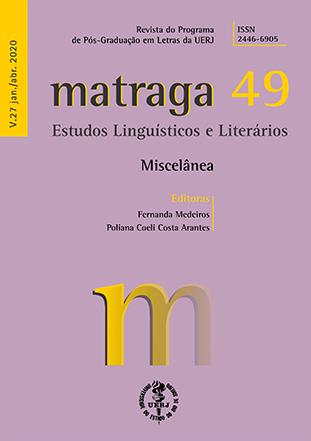The female “non-role” in Mana Maria
DOI:
https://doi.org/10.12957/matraga.2020.44335Keywords:
1930’s novels, Mana Maria, female character.Abstract
The only novel written by António de Alcântara Machado d’Oliveira, Mana Maria (1936), is considered by the main commentators of his works as the consolidation of his modernist prose style. Thus, this article aims to analyze the singularity of this work in the author’s production, based on the revision of the two trends of the novel critical tradition. Firstly, it is assumed that Mana Maria represents a step ahead when it comes to character construction, refusing the typification found in the works of the 1920’s. Secondly, the novel starts to represent the defense of the “400th anniversary paulistas”, a portrait of a socially decaying oligarchy, divided between the glorification of the past and the trivialization of the present. The novel allegedly also symbolizes São Paulo’s bitter response to Brazil’s reaction during the Constitutionalist Revolution (1932). In order to look into the critical tradition and the issue of character construction in the 1930’s novels, the analyses by Mário de Andrade (1936), Luís Toledo Machado (1970), Cecília de Lara (1988), Sérgio Miceli (2001) and Luís Bueno (2015), among others, were helpful. On the basis of the theoretical background proposed, it becomes evident that this novel represents a turning point in A. de A. M.’s career. Thus, one can note that the female role acquires a new status within the author’s work, whilst intersecting with powerful female representations that permeate the 1930’s novels.
Downloads
Downloads
Published
How to Cite
Issue
Section
License
Authorization
Matraga – Scientific Journal of the Post-graduate Program in Arts and Humanities of UERJ is authorized to publish the article submitted here, if it is accepted for online publication. It is attested that the contribution is original, that it is not being submitted to another publisher for publication, and that this statement is the expression of truth.
The works published in Matraga's virtual space – Scientific Journal of the Post-graduate Program in Arts and Humanities of UERJ will be automatically transferred, and your copyright is reserved to Matraga. Its reproduction, in whole or in part, is conditional on the citation of the authors and the data of the publication.

Matraga uses license Creative Commons - Attribution-Non-Commercial 4.0 International.





